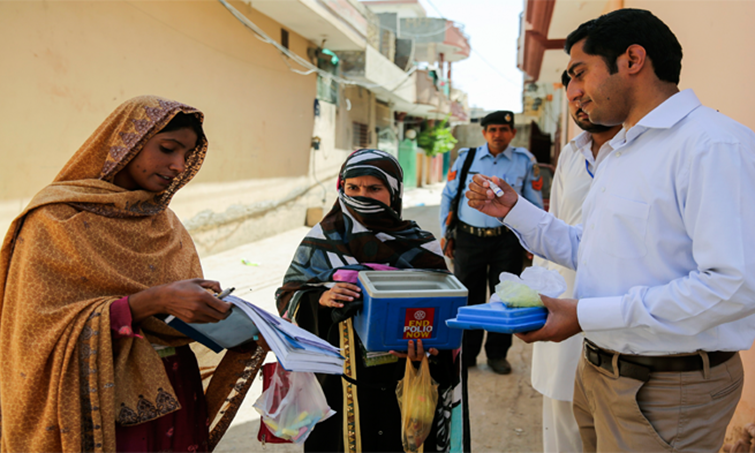
By Gaitty Ara Anis
Islamabad, 20 May, 2017: On an unusually hot morning in May, Sehat Muhafiz (health protector) mobile vaccination teams mark the gates of residents of Koral village in Islamabad. The markings denote numerous technical aspects serve to facilitate for teams, supervisors and monitors, but the most important of which is the count of children who either have been or should be given two drops of the oral polio vaccine (OPV) in this door to door campaign.
Twenty-six years old Saima represents the core of the campaign in Koral. Treading cautiously on the uneven streets of the area where she also resides, Saima is no stranger to the horrors of polio; she herself is a survivor of the vicious disease. “I was born in a village in Toba Tek Singh of Punjab and I do not remember being given any vaccination against polio or any other disease. I cannot walk properly, I limp,” says Saima with a tinge of pain in her voice while putting back the icepacks inside the vaccine carrier that she was instructed to keep under eight degrees Celsius.
“This is the second time I am taking part in the campaign. I have a three years old son who was also given these drops. Whenever I am taking rounds in the streets, I feel like saving someone’s future,” Saima says.
Saima still has 10 drops left in the OPV vial she carries in her blue box. Her next target is a house where she is expecting a couple of children under the age of five, but before going in she talks to the District Health Communication Support Officer Shehryar Malik who sounds satisfied with the coverage till that time.
“This time we are more prepared than ever. This campaign has been taken up aggressively, we have devised new strategies to resolve all issues including that of some families’ hesitation to vaccinate their children,” Malik says while giving back the tally sheet to Saima.
The Additional Deputy Commissioner of Islamabad, Waqas Rashid, is the focal person on polio campaigns at district level. He was confident to get rid of the basic hurdles that have adversely affected the campaigns in the past.
“The main challenge to eradicating polio in Pakistan now is no longer access or security but ensuring high quality vaccination campaigns that leave no child unvaccinated. The number of reluctant parents is at a very low ebb now as we are tracking back the trail of misperceptions and rumors. Sometimes we call community and religious leaders to reassure any particular family of the safety of the drops to their children.” Waqas says while he walks briskly with a team of Sehat Muhafiz in the narrow streets of the slum area in G7 Sector.
“As we move forward towards eradication with collective effort to reach each and every child with the vaccine, the campaign becomes more organized, focused and more effective in protecting our children from polio. Earlier, the campaign was usually carried out only by the health department, but now we have wider coordination between the various departments which is backstopped by the support of the community".
The campaign in Islamabad is part of the National Emergency Action Plan for Polio Eradication 2017. With the help of 1,100 health workers and volunteers who were given adequate training before the campaign more than 300,000 children under the age of five across Islamabad were vaccinated during the National Immunization Campaign in May.
The initiative to engage more than 200,000 Sehat Muhafiz has helped win the confidence of millions of parents due to the dedication of these frontline polio workers. This in turn brought down the rate of missed children to less than 0.08 per cent in the last one year..
Just at the end corner of the street stood Muhammad Afzal, a father who has brought his five and three years old Myra and Qasim at the fixed polio booth. “We are guests here; we live in Gujjar Khan District of Rawalpindi, but when I saw these posters it reminded me that it was time for this vaccine.” his lap during the administration of the vaccine dose Afzal says while trying to hold his restless son.
Such awareness is the result of the measures Pakistan, one of the last countries where the virus is still thriving, decided to undertake to clean its land of this virus. Eradication of this disease is an uphill task but the establishment of the National Emergency Centres where polio eradication partners work under government leadership to track the last remaining pockets of this virus and devising strategies to eliminate them by vaccinating each and every child under the age of five, is the only way forward.
The data shows that control of the poliovirus circulation at present is the best ever seen in Pakistan. This progress has been the result of government commitment and support at every level, strengthened programme performance and broad community acceptance of the polio vaccine. Consequently, the number of children paralysed by the wild poliovirus has dropped from 306 in 2014 to 54 in 2015 to 20 in 2016 and only two so far this year. But for polio eradication campaigners a single child missed in vaccination can bring us all back to square one; thus, keeping all government officials from top level leadership to the thousands of health workers on the ground completely on toes.
Meanwhile, Saima and many other Sehat Muhafiz stay busy trekking the streets, knocking doors, vaccinating children from the early hours of the morning till dusk, lest a single child would stay unvaccinated.
